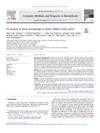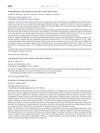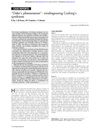 10 citations,
December 2015 in “Clinics in Dermatology”
10 citations,
December 2015 in “Clinics in Dermatology” Diabetes can lead to blindness and skin problems, and managing blood sugar and blood pressure is crucial to prevent these complications.
 November 2022 in “Journal of the Endocrine Society”
November 2022 in “Journal of the Endocrine Society” A 13-year-old girl's masculine symptoms improved after surgery for a rare adrenal tumor that produced male hormones.
 August 2024 in “Indian Journal Of Clinical Practice”
August 2024 in “Indian Journal Of Clinical Practice” A balanced diet and healthy lifestyle help manage PCOS symptoms.
 64 citations,
January 1998 in “Drugs”
64 citations,
January 1998 in “Drugs” Dienogest combined with ethinylestradiol is a highly effective birth control that improves menstrual symptoms and has manageable side effects.
5 citations,
August 2015 in “Sultan Qaboos University medical journal” Vitamin B12 deficiency can cause skin darkening and other symptoms, which improve with B12 supplements.
 9 citations,
July 2020 in “Experimental Dermatology”
9 citations,
July 2020 in “Experimental Dermatology” Topical L-thyroxine may help with wound healing and hair growth but should be used short-term due to potential risks.
 5 citations,
October 2014 in “Gynecological Endocrinology”
5 citations,
October 2014 in “Gynecological Endocrinology” Triptorelin helps evaluate hormone production in Sertoli-Leydig cell tumors.
 January 2010 in “Yearbook of Endocrinology”
January 2010 in “Yearbook of Endocrinology” Two new compounds can block androgen receptor activity in different ways and may lead to new treatments for androgen-related diseases.
 1 citations,
January 2021 in “Advances in animal and veterinary sciences”
1 citations,
January 2021 in “Advances in animal and veterinary sciences” Pets in Egypt can pass skin fungus, especially Microsporum canis, to humans, with outdoor and young pets being more at risk.
 May 2021 in “Journal of the Endocrine Society”
May 2021 in “Journal of the Endocrine Society” The 18-year-old girl likely has a condition called müllerian agenesis, which caused her to not have a uterus and experience no menstrual periods.
 30 citations,
October 2012 in “Current Opinion in Endocrinology, Diabetes and Obesity”
30 citations,
October 2012 in “Current Opinion in Endocrinology, Diabetes and Obesity” Thyroid hormones are important for skin health and might help treat skin diseases, but more research is needed to understand their effects fully.
 1 citations,
June 2021 in “Computer methods and programs in biomedicine”
1 citations,
June 2021 in “Computer methods and programs in biomedicine” Children with cancer had slightly more unusual facial shapes than healthy kids, but not enough to easily tell them apart.
 53 citations,
December 2015 in “JAMA Dermatology”
53 citations,
December 2015 in “JAMA Dermatology” Women with PCOS often have more body hair, acne, and skin darkening, and these signs are linked to metabolic issues like insulin resistance and high cholesterol.
 5 citations,
February 2010 in “Expert Review of Dermatology”
5 citations,
February 2010 in “Expert Review of Dermatology” Treating both the mind and skin together, especially by managing stress, can greatly improve outcomes for skin disorders linked to psychological issues.
 April 2023 in “Tropical Animal Health and Production”
April 2023 in “Tropical Animal Health and Production” Giving melatonin to sheep before the non-breeding season can improve their chances of reproducing in northwest Mexico.
 1 citations,
December 2006 in “Burns”
1 citations,
December 2006 in “Burns” New therapies for burn wounds show promise in reducing pain, infection risk, and improving healing and physical outcomes.
 11 citations,
October 2003 in “Postgraduate Medical Journal”
11 citations,
October 2003 in “Postgraduate Medical Journal” Doctors often diagnose Cushing's syndrome late, which worsens symptoms; earlier detection is needed.
 November 2022 in “Journal of the Endocrine Society”
November 2022 in “Journal of the Endocrine Society” A transman experienced lasting virilization symptoms after stopping testosterone, which were resolved with estradiol treatment.
 August 2009 in “International Journal of Dermatology”
August 2009 in “International Journal of Dermatology” A postmenopausal woman's facial redness, acne, and excess hair were caused by too much hormone therapy for insomnia, but improved after stopping the treatment.
 15 citations,
August 1998 in “Australasian journal of dermatology”
15 citations,
August 1998 in “Australasian journal of dermatology” The document concludes that various cosmetic and drug treatments are available for hirsutism, and some new drugs show promise.
 7 citations,
January 2016 in “Experimental and Clinical Endocrinology & Diabetes”
7 citations,
January 2016 in “Experimental and Clinical Endocrinology & Diabetes” Simvastatin may help manage symptoms in women with non-classic congenital adrenal hyperplasia by lowering cholesterol and certain hormone levels.
 3 citations,
December 2021 in “Frontiers in endocrinology”
3 citations,
December 2021 in “Frontiers in endocrinology” A new mutation in the DCAF17 gene was found in a Chinese family, causing Woodhouse-Sakati syndrome and diabetes.
 January 2023 in “Journal of pharmacognosy and phytochemistry”
January 2023 in “Journal of pharmacognosy and phytochemistry” Herbal home remedies can effectively treat hair loss with fewer side effects.
 77 citations,
July 2020 in “Journal of the European Academy of Dermatology and Venereology”
77 citations,
July 2020 in “Journal of the European Academy of Dermatology and Venereology” Environmental factors, hormones, nutrition, and stress all significantly affect skin health and aging.
 10 citations,
May 2018 in “Forensic Science International”
10 citations,
May 2018 in “Forensic Science International” Shrunken heads retain some facial features and hair characteristics, allowing for limited individual identification.

The case showed the need for quick investigation of virilization in women and how emotional health is linked to physical health.
 3 citations,
November 2015 in “Endocrinology, Diabetes & Metabolism Case Reports”
3 citations,
November 2015 in “Endocrinology, Diabetes & Metabolism Case Reports” Ring Chromosome 11 may be linked to conditions like early puberty, excessive hair growth, hair loss, and type 2 diabetes.
29 citations,
February 2011 in “PloS one” Astressin-B can reverse and prevent hair loss in stressed mice.
6 citations,
January 2013 in “Journal of Veterinary Medical Science” The dog's skin and anemia issues returned after stopping treatment for Babesia gibsoni.
1 citations,
January 2021 in “Brazilian Journal of Medical and Biological Research” Constant light exposure during pregnancy changes newborn rabbits' skin, affecting hair follicles, skin thickness, and pigment cells.


























